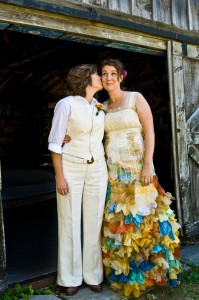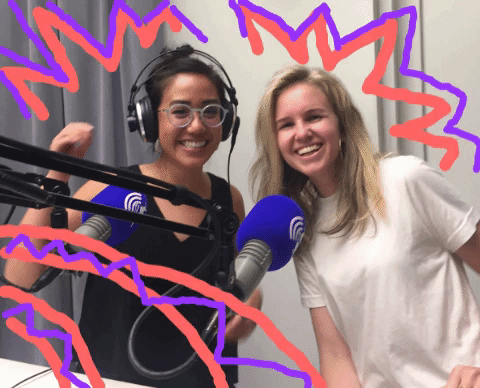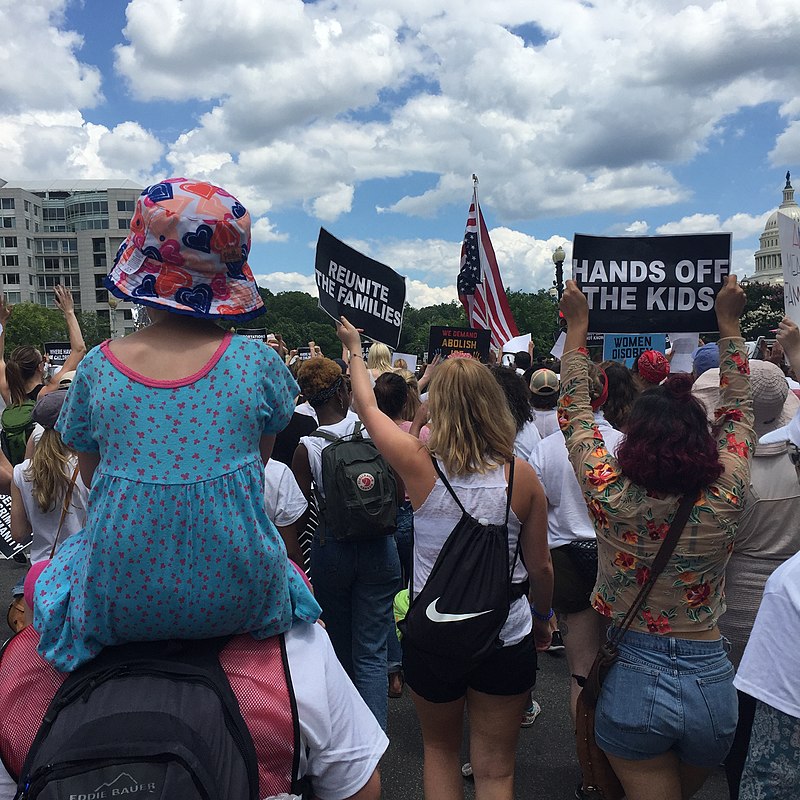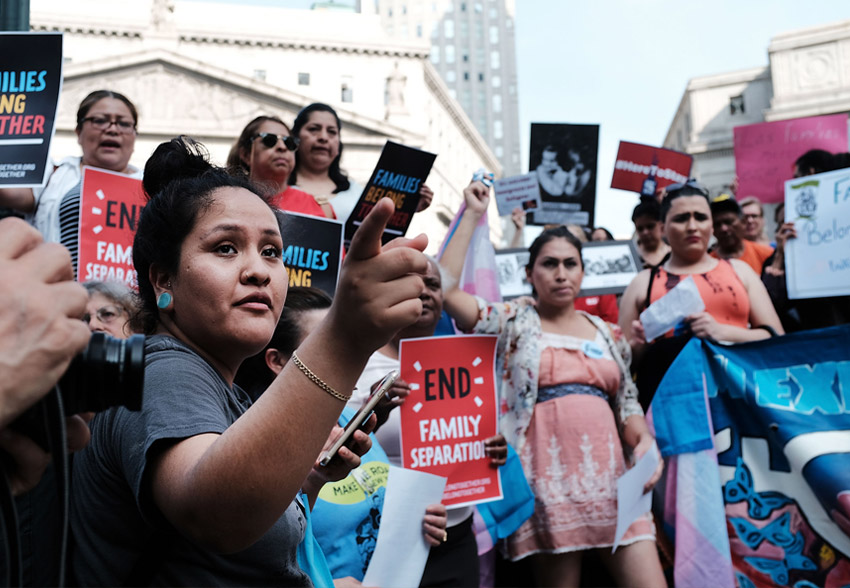 I grew up in a middle-class household with two working parents, weekly budgeting, coupon-clipping, and a 30-year mortgage on our small house. My brother and I knew that we had the privilege of an inheritance, but that it came in a different form than money: learning union songs on long car rides to our family’s off-the-grid cabin in Canada, exploratory discussions about the difference between socialism and capitalism, the satisfaction of a well-balanced check book, and a beautiful collection of political, social and environmental buttons from our parent’s lives as community organizers. Financially, we knew that we had more than many people, and we also knew that we had a lot less than some.
I grew up in a middle-class household with two working parents, weekly budgeting, coupon-clipping, and a 30-year mortgage on our small house. My brother and I knew that we had the privilege of an inheritance, but that it came in a different form than money: learning union songs on long car rides to our family’s off-the-grid cabin in Canada, exploratory discussions about the difference between socialism and capitalism, the satisfaction of a well-balanced check book, and a beautiful collection of political, social and environmental buttons from our parent’s lives as community organizers. Financially, we knew that we had more than many people, and we also knew that we had a lot less than some.
I fell in love with a sweet, generous, thoughtful, smart, and compassionate cutie who had grown up middle class. In the course of her lifetime, her family had experienced a significant increase in wealth, and we met just as she was learning to face and understand this new and sometimes confusing financial reality. Suddenly, I found myself in a relationship with a rich kid. I had access to a lot more: regularly going out to dinner, making donations to my favorite local grassroots organizers, and taking lots of flights to visit loved ones. Simultaneous to the thrill to the taste of a $6/loaf bread, there was also a lot of confusion about what this could mean for my own class identity.
There is a mixture of relief and confusion that comes with an upward class transition when economic inequality in the world is growing . It is easy to be angry towards “rich people in general”, and embarrassingly easy to let that same anger curl inward towards my partner. Similar to many poor-, working- and middle-class folks, I was taught to simultaneously worship and despise rich people. It is popularly accepted, especially within progressive communities, to express anger towards rich folks for having so much more, for controlling the media, for telling us that we’re not enough just as we are, and for making us believe that their way is the one way and anything else is “less than.” (Ever heard of the New World Order?) But for those of us in a cross-class relationship with a rich person, we can’t stop at just being angry and resentful. Like other poor-, working- and middle-class partners of folks with wealth, I am in a transition to becoming rich. In doing so, I have to now reckon with the judgements that I’ve had about “those rich people.” I have to directly face the socially constructed, yet constantly lived class system. It turns out that from the inside, wealth is a lot more nuanced than I had assumed. Instead of the easy resentment, I wake up every day, look into the face of the person that I love, and hold the contradiction of capitalist class disparities within my most intimate sphere of my life. Even more profound is that within myself, I get to love the part of me who is deeply rooted in my class of origin, as well as fall in love with the rich person that I am becoming.
So, for all of the partners of young people with wealth out there, for everyone who is in any stage of the the process of becoming rich, I want to share why Resource Generation is your community too.
1. So that we don’t have to feel so alone in the midst of class transition.
There are so many personal, relational, technical, and political questions that come up within a dramatically upward class transition, and it can be a deeply isolating experience. Partners of young people with wealth need each other to talk to, and identify with so that we can problem-solve, and mull through the contradictions together. We need each other to figure out important questions such as:
- How do we talk to our poor-, working-, or middle-class families and communities about our new access to wealth?
- How do we share the cost of living, including things that may have been financially inaccessible to us before (repayment of loans, tuition, vacations, gifts, recreation)?
- If we are queer and living in a state where marriage isn’t legal for us, how do we identify our relationship through the sharing of resources when it is actually illegal for us to pass much money back and forth without major tax consequences?
- If our partner shares money and resources with us, do we consider that wealth redistribution to be an act of social justice?
- What in our class background inspires any instincts to “grasp”, “hoard” and “protect” money?
- Will money keep us safe, or does true safety comes when everyone’s dignity and needs are attended to?
- What impact will this wealth have on our kids, and within what class culture will we raise a family?
2. Learning financial tools and skills that we may not have had access to before
Within the United States we do not have a culture of teaching literacy, planning skills or tools. While we are expected to believe that all of us can pull ourselves up by our bootstraps, the skills for how to do that are seemingly kept within a lock-box and only the wealthy have the keys. Additionally, it can be an emotional and cognitive challenging to claim the economic tools that have been kept strategically inaccessible to us and our loved ones. Yet, facing what it is that we don’t know can interrupt that system of disempowerment. Who knew that financial planning, investment strategy, tax policy, or the world of foundations could be so interesting?! And who could have imagined that these things could be relevant in our lives.
3. Sharing our knowledge of how the class system works
I have a good RG-partner friend from a working class background who recently told me about working in a steel factory in order to pay for her undergraduate education. I love how much pride she has about her class background, and also how complicated and nuanced that pride still remains. I love that she is on her journey to understand how class disparities have impacted her, both for better and for worse. She therefore has some important skills and insights about how money works that many folks with wealth miss; she’s a master at keeping and sticking to a budget, she can evaluate and self-determine the relative importance of money in her life, and comes to the earning, investing, stewarding and spending of money as an exercise in voting with her dollars, discretion and empowerment. Now, almost a decade after the steel factory, she is a skilled and valued manager of a major natural foods store, and seriously contemplating business school. In a world where people with wealth are expected to dominate the knowledge about how the class system works, RG partners actually hold that knowledge from first-hand, embodied, direct experience. We are some of the experts!
4. Learning how to use economic privilege is a skill that can be built
Ask any RG alum, and they’ll tell you that learning to leverage economic privilege is a skill that is built over time and with practice. For folks from poor-, working- and middle-class backgrounds, using the tools of economic privilege is like learning a new language, complete with new expressions, vocabulary, gestures and social graces. As partners, we are very aware of how powerful that “new language” is, and the impact that using it wisely can have on our families, communities, organizations and movements. When we practice talking about the impact of class on our lives, we help to open up important conversations that shed light onto that invisible structure. Partners, as straddlers between classes, can be messengers and validators of the shared human experience that exists beyond our socially constructed class system.
At Resource Generation, we can not claim to make anyone’s intimate, cross-class relationships easier. However, we do know that we can share tools to bring folks closer together across class (for example, check out this amazing Class Background Inventory, and these Cross-class resources from Class Action). We also know that social change happens in many different realms. It happens within policy-producing government, it happens within intentionally-aligned institutions, it happens within small social circles, and it happens across continents. That long arc of history that Dr. King [link] talks about, in it’s bend towards justice, passes through all of these sites of change, included through the realm of interpersonal relationships. We are all in the great drama of healing, becoming and unlearning – and at this point I feel like an expert on unlearning the 99% vs. 1% dynamic. I know that this is an experience that other partners at RG share as well. We are all entitled to transformation and work towards justice in our lives. Ultimately, I ask, how the work of reckoning the unequal financial and economic power between two individuals can be anything but healing, and anything but deep, personal, neurological social change?





Thanks so much for your post! Our inability to talk about money has really torn down community in this country; thanks for being bold and speaking up!
This book could be a great resource for you and the RG community. It’s offers a systems view of money – gift economics – and talks a lot about the cultural implications.
Thank you for this post — so clear and honest!
If you haven’t seen them yet, you and readers of this blog might really enjoy reading these back issues of More Than Money Journal, available as free downloads on http://www.morethanmoney.org: Issue #5, Money and Couples, Issue #11, Embracing our Power, Issue #17, Cross Class Relationships. You are not alone!